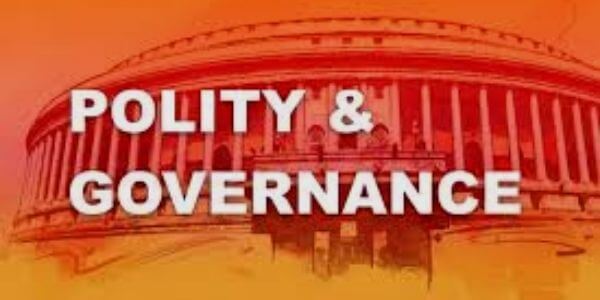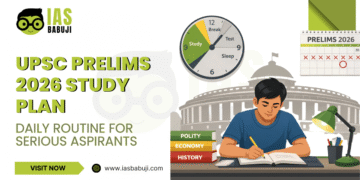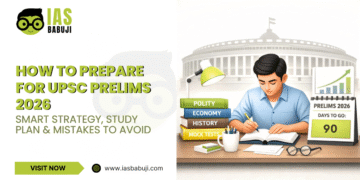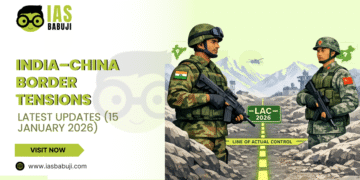Union Public Service Commission (UPSC), India’s central premier recruiting agency conducts the Civil Services Examination (CSE) to recruit IAS, IPS, IFS, and IRS officers for serving the country. Aspirants apply in lakhs, but only a few can qualify. So, you may be wondering what makes the difference for cracking the exam. It is the preparation strategy that takes you there. For answering the question of “How to prepare for the UPSC exam in the first attempt”, the candidate must have a good UPSC Preparation Strategy for Prelims first. So here, we will clear your doubts regarding IAS Exam Preparation for Prelims, as prelims are the first stage of the IAS Exam.
UPSC Exam Stages:
UPSC Civil Services Examination has three stages:
- Prelims
- Mains
- Interview
The first stage is Prelims, so we will discuss the UPSC Preparation Strategy for Prelims in this article.
UPSC Prelims:
UPSC Prelims is the first stage of the IAS exam. It’s the screening round of the mains stage of the Civil Services exam. Objective type (MCQ) questions are being asked in this exam. UPSC Prelims exam consists of two exams, General Studies – 1 and General Studies – 2 (CSAT). In the UPSC Preparation Strategy for Prelims, it is considered trickier to crack the General studies part of the exam as its highly complex. Also, the UPSC cutoff is assessed on the basis of the score in the General Studies exam. For cracking it, you need to understand the syllabus and the pattern of questions being asked in UPSC Prelims. So, the perfect way for UPSC Prelims Preparation is to have a structured plan for handling General Studies with ease.
Let us look at the 5 steps full-proof UPSC Preparation Strategy for Prelims.
UPSC Prepration Strategy for Prelims
Here, we have a five-step UPSC Preparation Strategy for Prelims to Prepare for UPSC Prelims Exam:
1. Know the exam well.
Before starting your preparation for UPSC Prelims, it is necessary to know the insights of the exam well enough. So, go through every notification of the IAS Exam properly to get yourself aware of the UPSC Exam syllabus, its timeline, pattern, and the eligibility criteria. Once you are done with knowing the syllabus and its patterns, then begin with picking up the previous year papers and glide through them for a better understanding of what is actually being asked in UPSC Prelims. If you put your time in these, then you will have a good amount of time through your overall UPSC Prelims Preparation journey. In addition, you should also start reading some articles regarding the UPSC Preparation Strategy for Prelims to get information about the IAS Exam.

2. Strengthen your foundation
Whatever your background is, you need to understand all the basics of the core subjects of the UPSC Syllabus. So, you should refer to NCERTs, one can also download it from the NCERT Official Website for free. Read them thoroughly at least twice before making the notes, then read the NCERT compilations. To save your time, prepare your notes along. Check out the NCERTs that you need to refer to.

3. Upgrade Your Knowledge with standard books
Now, it’s time to expand your knowledge after reading all the NCERTs. Start with reading the standard books for UPSC Prelims Preparation. Read these books at least twice, and make your handwritten clear notes from them as these notes will later be used for answer writing practice.
4. Practice Answer Writing along with Revision
Once you have successfully finished a subject from the NCERT as well as the standard books for UPSC Prelims, then start practicing the answer writing part. If you have not read all these books, then it would be a futile exercise as you will depend on the books only for the content to Prepare for UPSC Prelims Exam. So, it is important to do the consistent revision and take out your weekend free for the revision part of whatsoever new you have learned in a week.

5. Mock-Test Based Learning Approach
You should adopt a mock-test based learning approach two months before you Prepare for UPSC Prelims Exam. Try to give an exam like a mock test and then analyze your overall performance later. Identify the difference in what you have studied and how you have attempted the mock test. Check your weaknesses and brush up accordingly the concepts that you might have missed. It will help you in anxiety management as well as help you Prepare for UPSC Prelims Exam.
Subject-Wise UPSC Preparation Strategy for Prelims
1. Polity & Governance UPSC Preparation Strategy for Prelims
Lately, the significance of government policies has raised tremendously both in IAS Prelims and Mains Exam. This trend will continue forward and questions are more or less asked straightforward that can be easily answered after a careful study. There are chapters in Polity from which the questions are being asked often. Chapters such as Constitutional Developments, FDs, Union Government, FRs, DPSP, Judiciary, Local Governments, Amendments, Election Process, and Federalism.
Most of the books available for IAS Exam Preparation for Prelims lack some information on the current constitutional developments. So, keeping an eye on newspapers and magazines is important to develop a sound knowledge of the provisions of the Constitution. For instance, you must be aware of the historical judgments of the Supreme Court of India, such as Triple Talaq, Right to be forgotten, Aadhaar verdict, Right to privacy, and Adultery repealed.

Check out the preparation strategy for Polity here.
2. Life Science, General Science, and Science and Technology
This section is divided into four parts:
- Science and Technology
- Chemistry
- Biology
- Physics
Students from the Arts background find this section a nightmare for them. But, a basic understanding of science with thorough coverage of NCERTs will help you in solving tough majority questions. For the last 15 years, Science and Technology in IAS Preparation UPSC Prelims have become an important section of General Science. There is an overall increment in the current affairs weightage and the questions are being asked mainly from India-specific developments. For General Science, one must have an understanding of day-to-day science according to analysis.
So, observing things everyday and experiencing would be handy for the aspirant. For example, a question related to NAVIC came in the 2018 Prelims. Therefore, the future initiatives that ISRO will take like Gaganyaan and various other missions become of utmost importance. So, the aspirant must prepare a strategy of prioritization. In Life Sciences, the thrust is mainly on Zoology, but a few questions are there from Botany, particularly from biological diversity, agriculture, and plant system. But, most of the questions are related to human disease and systems in Zoology. So, prepare accordingly for IAS Exam Preparation for Prelims.
3. Economic and Social development Preparation Strategy for UPSC Prelims
This section includes Sustainable Development, Demographics, Poverty, Social Sector Initiatives, Socio-economic Inclusion, etc. Mostly, the questions here are from the Indian Economy, but one must have to keep updated on International Economics as well. For instance, the recent trade war and its impact on our Indian Market. So, according to the recent analysis, most of the questions come from Exim Policy, Public Finance, Agricultural Production, Money and Banking, and reforms.

3 to 4 questions are there from the different programs announced in the current and previous fiscal year. One has to keep an eye on financial and baking reforms such as Insolvency, Bankruptcy Law, NPAs, Twin Balance Deficit Problem, etc. But, there has been a shift in this section in the past few years. Questions come from contemporary nature. But, they require a proper understanding of the Indian Economy’s static areas. So, one must follow the budget and economic survey. You can achieve a basic understanding of the subject by going through class XI NCERT book of the Indian Economy to Prepare for UPSC Prelims Exam.
4. Geography and Environment
Being the most vital sections in IAS Preparation for UPSC Prelims, it covers a good amount of questions. So, one must need a thorough understanding of the physical aspects of India in Indian Geography with clarity on the locations being the important minimum requirement. The main focus is on conceptual aspects of General Geography. More relevance is there with the contemporary developments in world geography. Rather than reading the newspaper every day, locate the places on your Atlas.

A new dimension in IAS Preparation for UPSC Prelims is the questions from the environment. The aspirant must be aware of the recent developments associated with Environment and Ecology related issues. Learn about the recent conferences and initiatives for those preserving the ecosystem and biodiversity of the world. Read NCERT books on Geography from class VI TO XII alongside Goh Cheng Leong’s “A Certificate Course in Physical and Human Geography”.
5. History and Culture
One can identify the pattern of previous year questions as the number of questions that are declining, simultaneously the difficulty decrease. Lately, the questions are being asked from the untouched areas of the previous years. But, most of the questions are being asked from modern history between 1857 and 1947 including the uprising of 1857, Governor Generals, Social Reform Movements, and National Movements. Be prepared for the questions to be there on Vedic age, the Gupta period, and The Mauryan Period as those were dominating then. Medieval history’s important topics are the Mughal periods and the Sultanate. Topics like the Bahmani Kingdom, South dynasties, Marathas are getting more important than before lately. So, a thorough knowledge of Indian culture helps in scoring good marks in UPSC Prelims.
6. Current Affairs
The weightage of Current Affairs has been raising every year and has gained maximum significance. It’s a vast area of international and national importance with multilateral developments, sports, prizes, and honors. But, these are the general knowledge questions. So, reading newspapers and magazines is not sufficient to solve such general knowledge questions. One can handle this subject with ease and proper planning and time management. One should go through all the current affairs and revise them daily for IAS Exam Preparation for Prelims.

7. General Studies Paper-II (CSAT)
There was a change in the syllabus of the IAS Exam, CSAT was introduced which is the second paper comprising General Mental Ability and Reasoning. But, the paper now comes tough. UPSC frames the questions now from the least expected areas which make the preparation more difficult. So, candidates have to secure a minimum of 33% marks as of qualifying viewpoint. They consider a candidate to fail for selection if not able to secure more than 33%. Reasoning and Comprehension questions are included in the paper, so proper practice is needed.
Also check about other UPSC Strategy like How to do Essay Writing, Cracking UPSC in First Attempt, Interview Process of IAS Exam & How to prepare for overall exam.
FAQs I UPSC Preparation Strategy for Prelims
Candidate has to find new keywords, schemes, and concepts like nudging, economic trends, missing women, and other new terms related to ongoing socio-economic issues such as hunger, poverty, unemployment, etc.
As we all know, practice makes a man perfect. So, solving numerous MCQs is the key to enhance your skills. But, be attentive to those questions about which you do not know much. Study each statement and use logic to attempt it. One has to use common sense while answering. For instance, if a question is of identifying a national park of a state, then one can link it with its name. One can easily distinguish between the names of the southern and northern states. So, practice with an approach to learn that skill with knowledge.
1. Buddhism and Jainism, Indian Philosophies.
2. Architecture – Temples or forts, etc.
3. Dance and Music including folk.
4. Paintings and Literature. (Learn the important ones)
Stick to standard sources such as UPSC prelims questions papers, Spectrum, Bipin Chandra. Most of the questions will be solved through them.
For example, if a question arrives related to Gandhiji, you can choose select options wisely if you have read modern India in depth. But, these kinds of questions are left blank by the students as they consider it a basic question. So, always prepare to keep the cost-benefit ratio in your mind.
Editor’s Note | UPSC Preparation Strategy for Prelims
We hope that the above-mentioned tips for UPSC Preparation Strategy for Prelims will help you to improve in IAS Exam Preparation for Prelims. Knowing the syllabus from the core and preparing a relevant strategy for working over UPSC Prelims Preparation will help you achieve a good score. So, just stay consistent in your preparation and revise what all you have studied.







